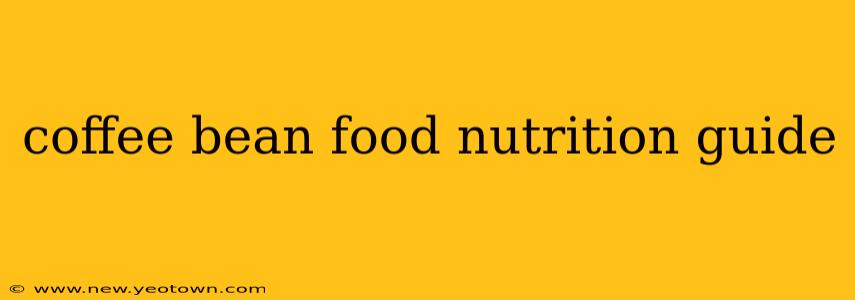The aroma alone is enough to transport you – the rich, intoxicating scent of freshly roasted coffee beans. But beyond the delightful fragrance lies a world of nutritional benefits often overlooked. This comprehensive guide delves into the nutritional powerhouse that is the humble coffee bean, exploring its composition, health impacts, and answering some frequently asked questions.
Let's embark on this caffeinated journey together!
What are the Nutritional Benefits of Coffee Beans?
Our story begins with the humble coffee bean itself, a tiny seed packed with surprising nutritional value. While we primarily consume coffee as a brewed beverage, it's crucial to understand the nutritional profile of the bean before it's ground and steeped. Coffee beans, depending on the variety and roast, are a decent source of several essential nutrients. These include various antioxidants, notably chlorogenic acids, which are linked to numerous health advantages. They also contain small amounts of essential minerals like magnesium and potassium, contributing to overall health and well-being. However, it's important to note that the nutritional content can change depending on the roasting process; darker roasts generally have fewer nutrients than lighter roasts.
Are Coffee Beans Good for Weight Loss?
This is a question frequently asked by health-conscious coffee drinkers. While coffee beans themselves aren't a miracle weight-loss food, the caffeine and chlorogenic acids they contain can play a supporting role in weight management. Caffeine can boost metabolism and increase energy expenditure, potentially aiding in calorie burning. Additionally, chlorogenic acids are believed to help regulate blood sugar levels and reduce fat absorption. However, it’s crucial to remember that weight loss is a complex process involving diet, exercise, and overall lifestyle. Coffee should be considered a complementary tool, not a magic bullet.
What are the Different Types of Coffee Beans and Their Nutritional Differences?
The world of coffee beans is vast and diverse, with numerous varieties boasting unique flavor profiles and subtle nutritional differences. Arabica, Robusta, and Liberica are three major species, each with its own characteristics. Arabica beans, known for their mild acidity and aromatic complexity, are the most widely consumed. Robusta beans, on the other hand, are higher in caffeine and often used in espresso blends. Liberica beans, less common, possess a strong, sometimes smoky flavor. While the precise nutrient content varies by bean type, roast, and growing conditions, the overall nutritional benefits are generally similar across the board.
How Many Calories are in Coffee Beans?
The caloric content of coffee beans depends heavily on the type of bean and the roast. A typical serving size (approximately 1 ounce or 28 grams) of unroasted coffee beans contains roughly 100-120 calories. However, this number can fluctuate based on factors such as the bean's moisture content and processing methods. It's worth noting that the roasting process itself can affect the caloric content, although the change is generally not drastic. It's always best to check the specific nutritional information provided by the coffee bean producer.
Are Coffee Beans a Good Source of Antioxidants?
Absolutely! Coffee beans are packed with antioxidants, primarily chlorogenic acids. These potent compounds are known for their ability to combat free radicals in the body, potentially reducing the risk of chronic diseases. The antioxidant content can vary depending on factors such as the variety of coffee bean, roasting method, and brewing technique. However, even a moderate consumption of coffee can contribute significantly to your daily antioxidant intake. Remember, a balanced diet is key for optimal antioxidant levels.
Can I Eat Coffee Beans Directly?
While technically you can eat coffee beans directly, it's generally not recommended. Unroasted beans are quite hard and difficult to chew, and their intense bitterness may not be palatable for everyone. Roasting significantly alters the bean's texture and taste, making it more digestible and less intense. However, even roasted beans are best enjoyed in brewed form, as chewing on them could potentially lead to digestive discomfort.
Conclusion: A Versatile and Nutritious Bean
The journey through the nutritional landscape of the coffee bean has revealed a fascinating picture: a tiny seed packed with surprising health benefits. From its antioxidant prowess to its potential role in weight management, the coffee bean deserves a place in a balanced and healthy diet. While it's not a standalone health food, the moderate consumption of coffee, made from these remarkable beans, can be a delicious and beneficial addition to your daily routine. Remember to consult with a healthcare professional or registered dietitian for personalized dietary advice.

